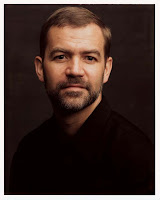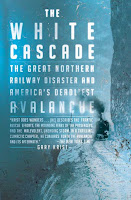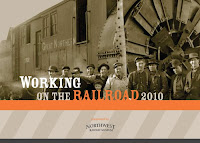The story behind the storytelling is unexpected. Gary Krist didn’t start out to write a narrative nonfiction book about the Wellington Disaster. For one thing, he wrote novels and short stories. For another, he had never heard of the Wellington Disaster.
 In an interview with Failure Magazine, Krist explains that a total fluke inspired him to write The White Cascade: The Great Northern Railway Disaster and America’s Deadliest Avalanche. “I was researching a different topic—the Duke of Wellington—and the Google result included something about a Wellington disaster. I had never heard of it so I clicked on the link and started reading. It turned out to be this incredible story that—except for a couple of privately or regionally published books—had not been written about.”
In an interview with Failure Magazine, Krist explains that a total fluke inspired him to write The White Cascade: The Great Northern Railway Disaster and America’s Deadliest Avalanche. “I was researching a different topic—the Duke of Wellington—and the Google result included something about a Wellington disaster. I had never heard of it so I clicked on the link and started reading. It turned out to be this incredible story that—except for a couple of privately or regionally published books—had not been written about.”
In fact, in an original essay called “A Fresh Chapter of History,” Krist says that a few minutes after clicking on that link, he “knew exactly what [he] would be doing for the next three or four years of [his] life.” He speaks of America’s forgotten stories—the Wellington tragedy in particular, which demonstrates the courage and sacrifice that helped shape the country.
Early in his research, he realized that fiction wouldn’t do the story justice. The bare truth was too dramatic. Plus, the facts needed telling since historians had not written much about the event. The result is narrative nonfiction (not a historical novel) free of invented dialogue and characters. Krist’s careful research encompasses not only the event, but the period in which it took place, the “Golden Age of Grand Disasters.”
In an interview with Boise State Radio’s Bob Kustra, Krist says that the March 1, 1910, avalanche that swept two trains off the tracks occurred during “an era when our technological reach exceeded our grasp. We knew how to put trains in these mountainous places. We knew how to build these big ships that supposedly were unsinkable. We. . .did know how to do them, but we didn’t know how to do them safely yet. So this is kind of a transition era when technology was leaping forward at a furious pace, but the safety element was a little bit lagging.” Consequently, the Wellington Disaster was part of a process evolving at that time that led to greater corporate liability, responsibility and safety.

Krist’s second narrative nonfiction book, American Colossus: An Epic of Chicago, will be published in 2010 or 2011. It portrays an extraordinary 12-day period in the Chicago of 1919. Before writing The White Cascade (published in hardcover in 2007 and paperback in 2008), Krist wrote three novels—Bad Chemistry, Chaos Theory and Extravagance—and two short story collections—The Garden State and Bone by Bone. In addition he has written op-eds for The New York Times and Newsday, articles for a number of publications including National Geographic Traveler and The Wall Street Journal, and book reviews for The New York Times Book Review, Salon and The Washington Post Book World. He has received The Stephen Crane Award, The Sue Kaufman Prize from the American Academy of Arts and Letters, a Lowell Thomas Gold Medal for Travel Journalism, and a fellowship from the National Endowment for the Arts.
 Gary Krist lives in Bethesda, Maryland. He explored Washington, including the Iron Goat Trail along the railroad grade where the avalanche occurred, while researching The White Cascade. He returns to Washington to speak at “Working on the Railroad 2010,” a benefit for the Northwest Railway Museum March 5, 6:00-9:00 PM, at Snoqualmie Ridge TPC Golf Club, 36005 SE Ridge Street, Snoqualmie. You may purchase tickets ($100/ticket or $700/table for 8) by phone at 425-888-3030 ext. 202 or in person at the Depot Bookstore, 38625 SE King Street, Snoqualmie.
Gary Krist lives in Bethesda, Maryland. He explored Washington, including the Iron Goat Trail along the railroad grade where the avalanche occurred, while researching The White Cascade. He returns to Washington to speak at “Working on the Railroad 2010,” a benefit for the Northwest Railway Museum March 5, 6:00-9:00 PM, at Snoqualmie Ridge TPC Golf Club, 36005 SE Ridge Street, Snoqualmie. You may purchase tickets ($100/ticket or $700/table for 8) by phone at 425-888-3030 ext. 202 or in person at the Depot Bookstore, 38625 SE King Street, Snoqualmie.
Museum Director Richard Anderson read The White Cascade out of personal interest last year and got in contact with Gary Krist through Skykomish Historical Society’s Bob Kelly. The Northwest Railway Museum is looking forward to welcoming Krist to Snoqualmie. You’re invited to hear firsthand his adventures in researching and writing about a significant event in railroad and Washington history.

